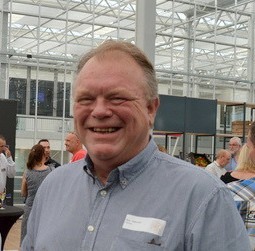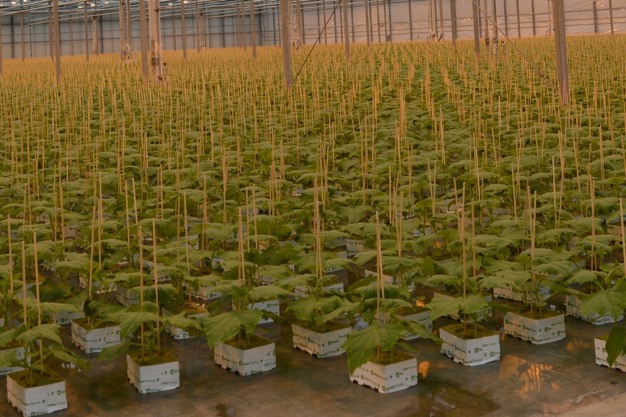The abbreviation GSPP is widely known in the industry, especially among seed companies and plant breeders. If it were up to a group of plant breeders, the abbreviation HSPO would soon become widely known. It stands for Hygiene System Plant Propagation.
 In collaboration with plant breeders, Naktuinbouw and Plantum have set up a hygiene and quality care system for the propagation sector. After successful pilots, a group of propagators of 'warm vegetable plants' will be the first to start using it. Other propagators may follow later, and international interest in the system has already been shown, shares Plantum's Rob Neijenhof, although that is not the current focus.
In collaboration with plant breeders, Naktuinbouw and Plantum have set up a hygiene and quality care system for the propagation sector. After successful pilots, a group of propagators of 'warm vegetable plants' will be the first to start using it. Other propagators may follow later, and international interest in the system has already been shown, shares Plantum's Rob Neijenhof, although that is not the current focus.
Instead, the focus is on further professionalizing the Dutch plant breeding industry. "Against many diseases and pests there is now no option other than taking hygiene measures," observes Neijenhof, the deputy director of Plantum and also the man within Plantum who deals with the plant growing world.
The idea to set up a hygiene and quality assurance system specifically for plant breeders arose when the tomato sector began facing tomato chlorosis virus (ToCV) and then rugose virus (ToBRFV), respectively. The authorized package of crop protection products was only decreasing, whilst the number of diseases and hazards increased. Hygiene measures aimed at preventing diseases and pests are therefore becoming increasingly important.
Trade restrictions
Rob hears from plant growers that more and more quarters are asking questions about the hygiene package they work with. Of course, growers want to know, but banks, among others, and the NVWA also ask about it.
To illustrate, Rob cites as an example the still sudden restrictions imposed on the import of tomato and pepper plants from the UK late last year in connection with Brexit. Additional tests were required. "It was announced, but the actual implementation came suddenly, right at the start of the season. For a while, we feared that the entire Maasdijk would be full of trucks on their way to the ferry."
Quick negotiations between the NVWA and British colleagues prevented that. However, the situation did prove once again the importance of a protocol, to which plant growers can refer. "Such a protocol individual plant growers already have, but it is not uniform," he said. Being able to refer to a central, uniform protocol, with a certificate attached to it, facilitates the situation.
Similarity and difference with GSPP
But what is in the Hygiene System Plant Propagation? Rob explains that there are great similarities with Good Seed and Plant Practices, otherwise known as GSPP. GSPP came into being in 2011, in response to problems with Clavibacter. Currently, however, plant breeders are dealing with more than just Clavibacter. "There is a need for a system that provides broad coverage."
The palette of micro-organisms and viruses to consider is expanding rapidly. The HSPP looks wider than one pathogen. The system contains general requirements and does not prescribe everything in detail. According to Rob, it is therefore also a quality system rather than a hygiene protocol. "Companies are given freedom in how they deal with it," he says.

Start
The HSPO requires an inventory of all hygiene risks at a propagator. During the pilots, at some companies that "have hygiene very high on their agenda", they still discovered some omissions, which the man who worked on the system together with Adrie Molenaar knows. The HSPO serves exactly that purpose: to raise hygiene and quality standards even further. Part of the HSPO will also be a technical working group. This working group will regularly evaluate the system and see if improvements can be made.
Plantum's deputy director estimates that initially perhaps half of the 15 or so propagators of 'warm vegetable plants' will participate. They really want to start in early 2025. Naktuinbouw's sector council has already approved the system. The Naktuinbouw Board still has to formally approve the system. Naktuinbouw is also the party that will perform the inspections.
The intention is for HSPO to become a fully-fledged part of the inspection system. One of the advantages of HSPO could be that Naktuinbouw could do fewer inspections of the certified companies, but in that case, it must be possible to establish that employees have the right knowledge. Because HSPO is used for legal purposes, it is not enough to accept only a sprayer's license, for example. Initially, however, a "slightly lightened regime" will be started. Rob: "The topic of 'mandatory training as part of HSPO authorization' will certainly be addressed at a later stage."
No advertising
That precisely in the Netherlands this initiative has been taken makes sense. "Dutch plant growers have the most to lose. With us, the product largely crosses the border." Not all plants remain in their own country, unlike plant growers in Germany and France, among others. Those produce more for their own country. "There should be European regulations for this," Rob believes. But, he notes, with the UK, among others, as a new 'third country', there is still a need for a good uniform protocol.
International roll-out of the HSPO, as did happen with GSPP, is not the primary goal. Rob emphasizes that the system is not an 'advertising or marketing tool'. He draws the comparison between booking a big trip with a travel agency that is or is not a member of the Algemene Nederlandse Vereniging van Reisondernemingen. "If you book a big trip, you are more likely to choose a party affiliated to the ANVR because you get many guarantees with it."
Working with the HSPO is more accessible and broader for plant growers, but not easier. Nor is it a system cast in concrete. It is a good start, but with the technical working group, as mentioned, the system will always be evaluated. "That way, we can see where any bottlenecks remain or whether we need to tighten things up a bit more to grow commercially clean plants in the best possible way. We are starting with 'hot vegetable plants', but plant growers of 'cold vegetable plants' also feel the need and see the necessity of securing their hygiene measures."
For more information:
Plantum
Tel: +31 (0)182 68 86 68
info@plantum.nl
www.plantum.nl
